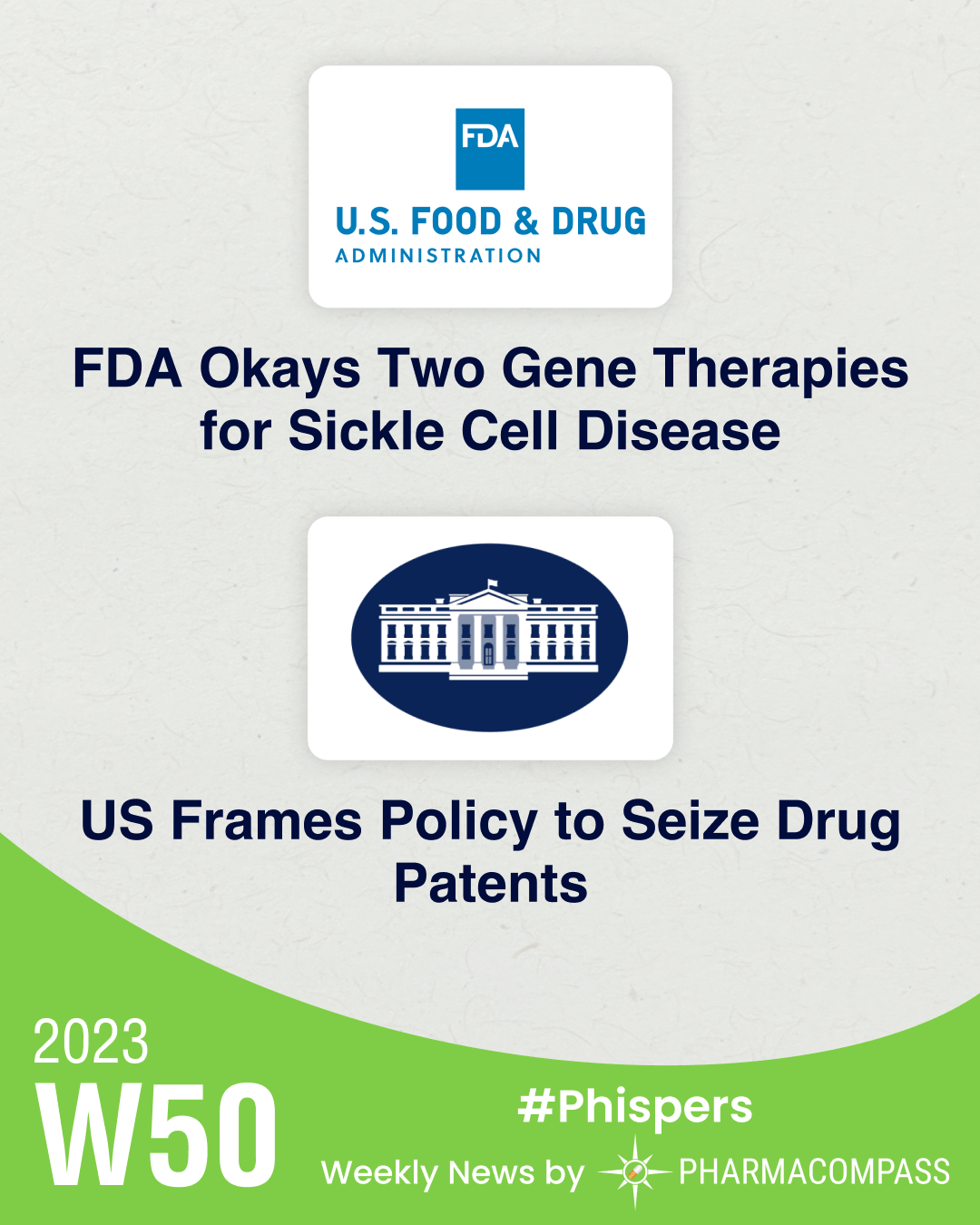
By PharmaCompass
2023-12-14
Impressions: 1,843 Article || 1 Video
This week’s Phispers notes groundbreaking developments, with the US Food and Drug Administration (FDA) approving the Nobel Prize-winning CRISPR gene editing technology for sickle cell disease (SCD). The agency also approved bluebird bio’s Lyfgenia for SCD. Additionally, Pfizer’s therapy for SCD showed potential in a mid-to-late-stage trial.
Pfizer also put to rest the Federal Trade Commission’s concerns regarding its US$ 43 billion Seagen acquisition, allowing the deal to go through. In other news, Bristol Myers Squibb (BMS) inked a potential US$ 8.4 billion deal with Sichuan Biokin Pharmaceutical’s unit SystImmune to co-develop and commercialize one of its antibody-drug conjugate (ADC) cancer treatments outside of China. And, AstraZeneca entered the RSV vaccine race with US$ 1.1 billion acquisition of Icosavax.
In regulatory news, FDA slapped two Indian drugmakers, Torrent Pharma and Laurus Labs’ subsidiary Laurus Synthesis Private Ltd, with Form 483s.
As the US gears up for a presidential election in 2024, the Biden administration announced it is setting new policy that allows the US government to seize medicine patents held by drugmakers for therapies whose development was taxpayer-funded, if it believes they are not “reasonably available and affordable.”
Across the pond, the European Commission has listed over 300 medications aimed at avoiding shortages of vital drugs.
FDA okays two gene therapies for sickle cell disease — CRISPR’s Casgevy, bluebird’s Lyfgenia
Less than a month after the United Kingdom approved the world’s first human gene therapy for sickle-cell disease and beta thalassemia, the US has followed suit. FDA not only approved CRISPR Therapeutics and Vertex Pharmaceuticals’ Casgevy for SCD, it also approved bluebird bio’s Lyfgenia (lovotibeglogene autotemcel), also known as lovo-cel, for the treatment of SCD in patients aged 12 and older who have a history of vaso-occlusive events (VOEs). Lyfgenia is a one-time gene therapy that has the potential to resolve vaso-occlusive events and is custom-designed to treat the underlying cause of sickle cell disease.
Casgevy (exa-cel) relies on the CRISPR/Cas9 gene editing technology that won its scientists the Nobel Prize in Chemistry in 2020. Casgevy will hit the market early next year, and costs US$ 2.2 million. Lyfgenia is costlier at US$ 3.1 million.
Meanwhile, another sickle cell disease therapy being developed by Pfizer showed potential in a portion of a mid-to-late-stage trial. The oral drug GBT-601 is a successor to the American multinational’s approved treatment Oxbryta (voxelotor), which it acquired after it bought Global Blood Therapeutics in 2022 for US$ 5.4 billion.
Biden administration sets ‘march-in’ policy to seize patents of costly drugs
The Biden administration has announced it is setting a new policy that allows the US government to seize medicine patents held by drugmakers for therapies whose development was taxpayer-funded, if it believes they are not “reasonably available and affordable.” Taxpayers have contributed hundreds of billions of dollars to research catalyzing the development of new prescription drugs, the White House has said.
Passed in 1980, the Bayh-Dole Act allows developers to retain ownership of inventions they made using federal funds, and provides “march-in” rights to the government. For the first time since the act was passed, federal agencies have a proposed framework on how they can use “march-in” authority to license third-party products.
EU lists 300 critical meds: The European Commission has published its first version of the list of critical medicines as part of a sweeping change of laws governing the pharmaceuticals industry. The list has over 300 medications and is aimed at avoiding shortages of vital drugs. Many members of the bloc are keen on avoiding over-reliance on China and India, two nations that make a majority of generics and basic equipment.
Keytruda, Lenvima combo fails as first-line therapy for uterine cancer in phase 3 trial
The combo therapy of Merck’s blockbuster drug Keytruda (pembrolizumab) and Eisai's Lenvima (lenvatinib) has failed in a late-stage trial to meet both of its primary endpoints (of overall survival and progression-free survival) as a first line of treatment for a form of uterine cancer. Advanced or recurrent endometrial cancer is the most common kind of uterine cancer.
Pfizer’s marstacimab shows benefits in late-stage trial on hemophilia patients
In a late-stage study, Pfizer’s marstacimab showed a significant clinical effect on annualized bleeding rates (ABR) for patients with severe hemophilia A and moderate to severe hemophilia B. Compared to routine prophylaxis and on-demand treatment, marstacimab reduced ABR by 35 percent and 92 percent, respectively. If approved, marstacimab could become the first once-weekly subcutaneous treatment for people living with hemophilia B and the first treatment administered as a flat dose for people living with hemophilia A or B.
Astra buys Icosavax, gains access to its RSV-HMPV combo vaccine candidate
AstraZeneca has agreed to acquire infectious disease vaccine developer Icosavax, including its potential first-in-class respiratory syncytial virus (RSV) and human metapneumovirus (HMPV) combination vaccine IVX-A12 for up to US$ 1.1 billion. There are currently no treatments or preventative therapies for HMPV and no combination vaccines for RSV, and IVX-A12 is the most advanced candidate.
BMS inks ADC deal: In what is yet another antibody-drug conjugate (ADC) deal this year, Bristol Myers Squibb (BMS) said it will pay US$ 800 million upfront to Sichuan Biokin Pharmaceutical’s Washington-based unit SystImmune to co-develop and commercialize one of its ADC cancer treatments outside China. The deal could potentially amount to a total value of US$ 8.4 billion if all milestones are achieved.
Pfizer gets FTC okay for Seagen buyout after donating rights to cancer drug
Pfizer has received all the required regulatory approvals from the US Federal Trade Commission (FTC) and expects to close its US$ 43 billion Seagen acquisition later this week. To put to rest concerns of the consumer protection agency, the New York-based drugmaker will donate its right to a 15 percent royalty on sales of cancer drug Bavencio (avelumab) to the American Association for Cancer Research, which amounted to US$ 271 million in 2022.
FDA slaps Form 483s on two Indian drugmakers — Laurus Synthesis, Torrent Pharma
FDA has issued two Form 483s to Indian drugmakers this week. Following an inspection from December 4 to 12 in Parawada near Visakhapatnam (Andhra Pradesh, India), Laurus Labs’ subsidiary Laurus Synthesis Private Ltd received a Form 483 with five observations. The US agency also conducted a pre-approval inspection at Torrent Pharma’s oral-oncology facility in Bileshwarpura (Gujarat, India), from December 5 to 11 and issued a Form 483 with five procedural observations. The company said there was no observation related to data integrity.
The PharmaCompass Newsletter – Sign Up, Stay Ahead
Feedback, help us to improve. Click here
Image Credit : Phisper Infographic by PharmaCompass license under CC BY 2.0
“ The article is based on the information available in public and which the author believes to be true. The author is not disseminating any information, which the author believes or knows, is confidential or in conflict with the privacy of any person. The views expressed or information supplied through this article is mere opinion and observation of the author. The author does not intend to defame, insult or, cause loss or damage to anyone, in any manner, through this article.”







